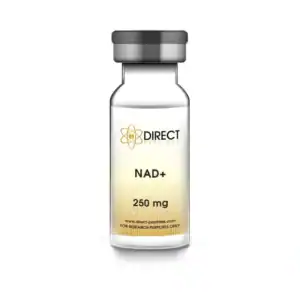Nicotinamide adenine dinucleotide (NAD) is an essential coenzyme found in every cell of the human body. It plays a key role in many critical biological functions. It is involved in energy production, DNA repair, mitochondrial function, and regulating cellular health.
Recent research in longevity has focused heavily on the benefits of NAD. This research looks at how boosting NAD+ levels might help slow down aging. It may also reduce the onset of age-related diseases and increase healthspan.
As we age, NAD+ levels naturally decline. This decline leads to cellular dysfunction, a decrease in mitochondrial energy production, and impaired DNA repair mechanisms. These changes contribute to aging and the development of numerous diseases.
These diseases include Alzheimer’s, cardiovascular diseases, and metabolic disorders. In longevity research, increasing NAD+ levels has been shown to reverse some of these effects. It helps restore mitochondrial function and promote overall cellular health.
Although many of these findings come from animal studies, the potential benefits of NAD in extending lifespan and improving healthspan have generated excitement in the scientific community. Estonia Researchers are increasingly looking into NAD+ supplementation. This research aims to counteract the decline of NAD levels with age and its subsequent effects on health.
One of the key benefits of NAD is its role in supporting cellular energy production. NAD+ is crucial for cellular respiration, a process where cells transform nutrients into usable energy, known as ATP (adenosine triphosphate).
ATP serves as the primary energy source for the cell, powering everything from basic metabolic functions to complex tasks like protein synthesis and cell division. When NAD+ levels drop with age, mitochondrial function is impaired.
This leads to a reduction in ATP production and an increase in oxidative stress. These changes contribute to fatigue, muscle weakness, and cognitive decline—common signs of aging. As NAD+ declines, cells become less efficient at producing energy. This accelerates the aging process.
Research into NAD+ supplementation shows promising results in restoring mitochondrial function and improving energy production. By replenishing NAD+ levels, it may be possible to enhance ATP production, improve mitochondrial health, and combat the effects of aging at the cellular level. This is one of the primary reasons why NAD is considered vital for longevity and healthspan.
Discover NAD+ from Direct Peptides Estonia, a vital coenzyme that supports cellular energy production and enhances overall health and longevity.
One of the most significant benefits of NAD is its critical role in DNA repair. Our DNA is constantly damaged by internal and external factors. These include oxidative stress, UV radiation, and normal metabolic activities. NAD+ is essential for activating enzymes like PARPs (Poly ADP-ribose polymerases). These enzymes are responsible for detecting and repairing DNA damage.
As (Nicotinamide adenine dinucleotide ) NAD levels decrease with age, the efficiency of DNA repair diminishes. This leads to an accumulation of DNA damage and mutations. This accumulation is a key driver of the aging process. It also contributes to the onset of age-related diseases such as cancer and neurodegenerative disorders. By increasing NAD+, researchers believe that DNA repair mechanisms can be restored. This could potentially slow aging and prevent diseases related to genetic mutations.
The benefits of NAD in DNA repair are crucial. They not only help maintain genomic integrity but also prevent the cellular dysfunction that leads to the development of chronic diseases. This underscores the importance of NAD+ in promoting longevity and reducing the risks associated with aging.
Explore Peptide Supplies at Direct Peptides Estonia for all your reconstitution requirements.
Another key benefit of NAD is its role in activating sirtuins, a family of proteins that regulate critical cellular processes. These include DNA repair, metabolism, and inflammation. Sirtuins have been referred to as “longevity proteins” because they are believed to help extend lifespan by promoting cellular maintenance and health. Sirtuins require NAD+ to function. This means that boosting NAD+ levels could activate these proteins and improve cellular health.
Sirtuins are involved in various processes related to aging. These processes include controlling the response to stress, regulating fat storage, and enhancing the body’s repair mechanisms. Higher levels of NAD+ have been shown to activate sirtuins.
This leads to better management of oxidative stress, improved metabolic function, and enhanced DNA repair. The benefits of NAD in activating these longevity-related proteins are critical for slowing down the aging process and promoting overall health.
By increasing NAD+ levels, researchers believe it’s possible to enhance the activity of sirtuins. This provides a potential pathway for extending lifespan and improving healthspan. This area of longevity research is one of the most exciting and promising applications of NAD+ supplementation.

As we age, the natural decline of NAD+ has significant effects on cellular function. One of the main consequences of NAD+ depletion is mitochondrial dysfunction. This causes reduced energy production, increased oxidative stress, and a greater risk of age-related diseases. Estonia Research shows that the decline in NAD+ is linked to conditions like Alzheimer’s, cardiovascular diseases, metabolic disorders, and even cancer.
The benefits of NAD supplementation have been shown in animal models. Increasing NAD+ levels restores mitochondrial function, enhances DNA repair, and reduces the impact of oxidative stress. This is why NAD+ supplementation has emerged as a potential tool for preventing or delaying many age-related conditions.
Restoring NAD+ levels through supplementation can slow the aging process. It may also reduce the risk of chronic diseases. This could lead to a healthier and longer life. For these reasons, NAD+ has become a focal point in longevity research and holds great promise for future therapies.
Mitochondria are the powerhouses of the cell. They are responsible for producing the energy needed for cellular functions. NAD+ is essential for maintaining mitochondrial health. It plays a role in oxidative phosphorylation, which produces ATP. As NAD+ levels decrease, mitochondrial function declines. This results in less energy production and more oxidative damage.
The decline of mitochondrial function is a hallmark of aging. It is linked to many age-related diseases, such as muscle weakness, neurodegeneration, and metabolic disorders. NAD+ supplementation has shown promise in improving mitochondrial function, restoring ATP production, and reducing oxidative stress. By boosting NAD+ levels, it may be possible to enhance mitochondrial health. This could help reduce the negative effects of aging and offer a pathway to longer, healthier lives.
The benefits of NAD in supporting mitochondrial health cannot be overstated. Mitochondria play a key role in overall health and longevity. The potential to restore mitochondrial function through NAD+ supplementation makes it an exciting area of longevity research.
 In addition to NAD+, FOXO4-DRI is another exciting development in longevity research. FOXO4-DRI is a peptide that targets senescent cells. These cells have stopped dividing but remain metabolically active. Senescent cells accumulate as we age and contribute to inflammation, tissue dysfunction, and the development of age-related diseases.
In addition to NAD+, FOXO4-DRI is another exciting development in longevity research. FOXO4-DRI is a peptide that targets senescent cells. These cells have stopped dividing but remain metabolically active. Senescent cells accumulate as we age and contribute to inflammation, tissue dysfunction, and the development of age-related diseases.
Unlike regular cells, senescent cells do not divide. However, they release harmful substances that cause inflammation. This accelerates the aging process and leads to tissue damage.
FOXO4-DRI works by specifically targeting and eliminating these senescent cells. It improves tissue regeneration and reduces the chronic inflammation associated with aging.
Studies have shown that FOXO4-DRI can improve the function of aging tissues. It can also reduce inflammation and enhance overall healthspan. While still in the experimental stage, FOXO4-DRI shows promise as a therapeutic approach to combat aging and improve quality of life in older individuals.
Explore FOXO4-DRI from Direct Peptides Estonia, a peptide that targets senescent cells to reduce inflammation and promote healthier aging.
Senescence is a process where cells stop dividing and enter a state of permanent arrest. While senescence plays a protective role in preventing the growth of cancerous cells, the accumulation of senescent cells in tissues over time significantly contributes to aging.
These cells release inflammatory molecules. These molecules damage surrounding cells, promote tissue dysfunction, and contribute to age-related diseases such as osteoarthritis, cardiovascular diseases, and neurodegenerative conditions.
By targeting and removing senescent cells, FOXO4-DRI offers a potential way to slow down the aging process. It can improve tissue function and enhance overall health. Eliminating senescent cells has been shown to improve tissue regeneration, reduce inflammation, and promote healthier aging. This makes FOXO4-DRI a key player in longevity research.
The benefits of NAD in longevity research are substantial. NAD+ plays a critical role in energy production, DNA repair, and mitochondrial health. This makes it essential for slowing down the aging process and improving overall health.
The potential to replenish NAD+ levels through supplementation offers an exciting pathway. It could extend lifespan and reduce the onset of age-related diseases.
Moreover, FOXO4-DRI, by targeting senescent cells, presents a novel approach to combating the effects of aging and improving healthspan. While NAD+ and FOXO4-DRI are still under investigation, their combined potential holds great promise. This potential is for future therapies aimed at promoting healthier aging and extending lifespan.
[1] Gomes AP, Price NL, Ling AJ, Moslehi JJ, Montgomery MK, Rajman L, White JP, Teodoro JS, Wrann CD, Hubbard BP, Mercken EM, Palmeira CM, de Cabo R, Rolo AP, Turner N, Bell EL, Sinclair DA. Declining NAD(+) induces a pseudohypoxic state disrupting nuclear-mitochondrial communication during aging. Cell. 2013 Dec 19;155(7):1624-38.
[2] Zhang H, Ryu D, Wu Y, Gariani K, Wang X, Luan P, D’Amico D, Ropelle ER, Lutolf MP, Aebersold R, Schoonjans K, Menzies KJ, Auwerx J. NAD⁺ repletion improves mitochondrial and stem cell function and enhances life span in mice. Science. 2016 Jun 17;352(6292):1436-43.
[3] Martens CR, Denman BA, Mazzo MR, Armstrong ML, Reisdorph N, McQueen MB, Chonchol M, Seals DR. Chronic nicotinamide riboside supplementation is well-tolerated and elevates NAD+ in healthy middle-aged and older adults. Nat Commun. 2018 Mar 29;9(1):1286.
[4] Zhang C, Xie Y, Chen H, Lv L, Yao J, Zhang M, Xia K, Feng X, Li Y, Liang X, Sun X, Deng C, Liu G. FOXO4-DRI alleviates age-related testosterone secretion insufficiency by targeting senescent Leydig cells in aged mice. Aging (Albany NY). 2020 Jan 20;12(2):1272-1284.
[5] Huang Y, He Y, Makarcyzk MJ, Lin H. Senolytic Peptide FOXO4-DRI Selectively Removes Senescent Cells From in vitro Expanded Human Chondrocytes. Front Bioeng Biotechnol. 2021 Apr 29;9:677576.
Shop ALL Peptide Vials from Direct Peptides Estonia today, your trusted supplier of premium clinical grade peptides online.
NAD+ supports brain function by maintaining cellular energy balance and mitochondrial activity in neural tissue. Research shows that adequate NAD+ levels help protect neurons from oxidative stress and metabolic damage. Pre clinical studies suggest improved neuronal resilience, but current human evidence remains limited and under active investigation.
NAD+ influences pathways involved in neuronal energy metabolism and DNA repair, which are critical for cognitive processes such as memory and focus. Animal studies demonstrate improved learning and cognitive performance when NAD+ levels increase. Human research has not yet confirmed consistent improvements in memory or attention.
NAD+ plays a central role in ATP production and cellular energy metabolism. Reduced NAD+ levels impair mitochondrial function, which may contribute to cellular fatigue. While mechanistic data support this relationship, clinical evidence showing direct fatigue reduction from NAD interventions remains limited.
NAD+ supports muscle cell energy production and mitochondrial function, both essential for muscle performance. Preclinical studies show that increased NAD levels improve muscle metabolism. Limited clinical observations suggest benefits in specific metabolic conditions, but consistent improvements in muscle strength in healthy subjects are not yet established.
NAD+ levels increase through endogenous biosynthesis pathways supported by dietary niacin intake, regular physical activity, and metabolic stress such as caloric restriction. Exercise activates enzymes involved in NAD recycling, while vitamin B3 compounds serve as direct precursors for NAD production in cells.

TWIN PACKS
NAD+ Peptide Vial
£41.48 – £149.31Price range: £41.48 through £149.31 Select options This product has multiple variants. The options may be chosen on the product page
Humanin Peptide Vial
£45.84 – £54.82Price range: £45.84 through £54.82 Select options This product has multiple variants. The options may be chosen on the product page
FOXO4-DRI Pre-Mixed Pen 10mg
£202.53 – £546.83Price range: £202.53 through £546.83 Select options This product has multiple variants. The options may be chosen on the product page
Epithalon Nasal Spray
£21.75 – £38.50Price range: £21.75 through £38.50 Select options This product has multiple variants. The options may be chosen on the product pageALL CONTENT AND PRODUCT INFORMATION AVAILABLE ON THIS WEBSITE IS FOR EDUCATIONAL PURPOSES ONLY.
DISCLAIMER: These products are intended solely as a research chemical only. This classification allows for their use only for research development and laboratory studies. The information available on our Estonia Direct Peptides website: https://direct-peptides.com is provided for educational purposes only. These products are not for human or animal use or consumption in any manner. Handling of these products should be limited to suitably qualified professionals. They are not to be classified as a drug, food, cosmetic, or medicinal product and must not be mislabelled or used as such.